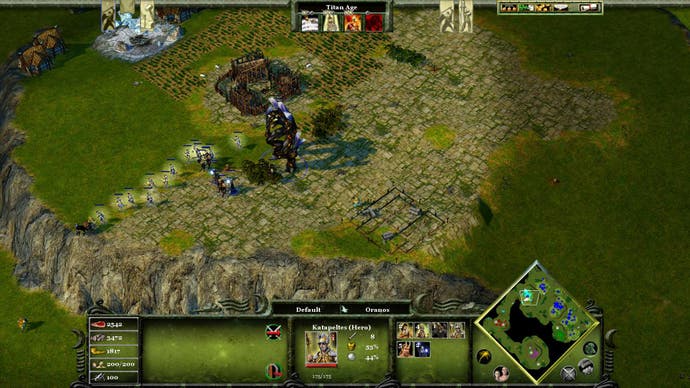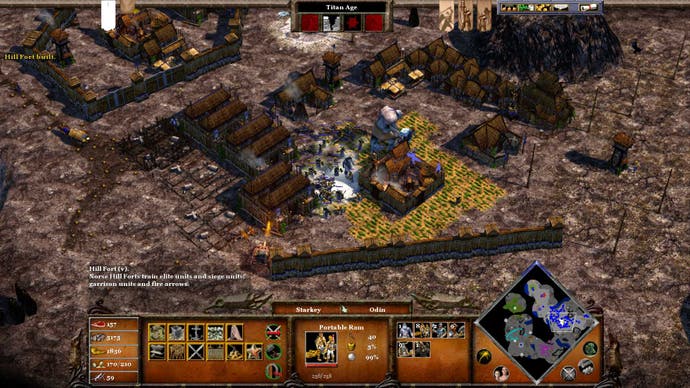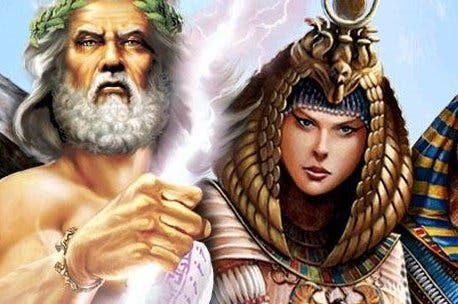Age of Mythology: Extended Edition review
Where is your god now?
Age of Empires 2 was one of my very first experiences with the real-time strategy genre. As pre-teens, my friends and I tried to get together for LAN parties as often as possible. After one particularly great night, I traded an old sound card I had for a copy of Age of Empires 2 and its expansion. From that point on, I was hooked on the series. A few years later, Age of Mythology messed with the clean balance, historical detail and polish of its predecessors; it was rougher, more aggressive and more playful all at once. A little over a decade later, in this Steam reissue, Age of Mythology retains much of its whimsy - but it's also clearly a relic of a bygone era.
Strategy tropes like resource gathering, base construction and unit management are all here in force. While Age of Mythology was definitely a huge step away from the series' formula, with only a few exceptions that distinction is more tonal than anything else. In Age of Mythology, you'll begin play as one of four ancient civilizations: the Greeks, the Norse, the Egyptians or the (fictional) Atlanteans. Each race has a radically different play-style, informed mostly by that culture's real-world mythology. The Norse, for example, are basically Vikings; their soldiers are their backbone and, unlike other races, which use civilian units to build up new bases, the Norse rely on their axe-and-hammer-wielding warriors.
A selection of races that each have a unique set of tactical considerations is far from unique, however. The draw here, as the title suggests, is the mythology of these four ancient societies. After selecting your civilisation, you'll also have three choices for a "Major God". They all have significant effects on how you can play and tend to highlight one of the core strengths of your chosen race. As you gather your resources, marshal armies and begin developing technology, minor gods will also become available. These figures often unlock new mythic units like sphinxes or manticores and new god powers like plagues or resource boons.
If that sounds like a lot to keep track of, it is. These choices can be overwhelming to new players, as they represent specific kinds of progression. If you're not familiar with what options you'll have down the line, then even picking a major god can be a tough decision.

These changes from Age of Empires, in addition to a shift in how the population cap is managed, all encourage a more chaotic, aggressive breed of strategy across the board. Instead of houses or supply depots, you'll require more and more town centres to support a larger army. There are a small number of "settlements" scattered across the map, and new town centres can only be founded at these spots. As such, early exploration and expansion is critical.
Age of Empires has always had a lot of options for turtling - particularly if you could successfully wall off a good chunk of stone, gold and forest. Mythology's defensive structures are often awkward and squishy, particularly in comparison to the earth-shattering power of gods. You'll often have access to at least one major hero or mythic unit that can tear through walls and fortresses, and unless you seek the favor of deities that encourage fortification, defensive play of any kind is tough.
Unfortunately, that also means the death of the kind of unorthodox manoeuvring that made me fall in love with this series in the first place. In all my LAN parties growing up, my favourite moments were always the spontaneous humour that resulted from a funny quip or a creative approach in a game. In one 4-v-4 match in Age of Empires 2, two players on the opposing team used themselves as a sacrifice. The other two cut their way through a massive forest to attack the shared base that my team thought was well-fortified. After the invasion began, we only lasted a couple of minutes before everyone in our medieval megalopolis was slain.
Age of Mythology doesn't facilitate that kind of unconventional play. It isn't refined enough to be a truly competitive strategy game, either - not these days, anyway. The main draw for the series, and the bread and butter of any halfway decent strategy game, is the ability to let aspiring tacticians be creative. Yet Age of Mythology, by design, imposes not just an aggressive style, but a specific kind of aggressive style. If you miss opportunities for early expansion, your loss is all but guaranteed.

This is mitigated somewhat in the late game with the ability to summon titans - huge monsters that dwarf the average soldier by ten times or more. Unfortunately, much like building wonders, the process isn't easy, and you'll already need to have stockpiled a decent chunk of resources to invest in a Titan Gate. As soon as you break ground on the supernatural doorway for your giant mythical warrior, all other players on the map will also be alerted to its presence. When summoned, everyone can see exactly where it is and where it's going. You'll get no chance for subterfuge, no opportunity for a surprise attack. At best, you can use your titan as a juicy target and a decoy for a sneak-stab with your other creatures - and that's not without its own downsides, the most glaring being predictability.
Unfortunately, Age of Mythology's single-player campaign doesn't fare much better. Previous series entries had the grounding of historical battles to base themselves on; you'd play through a series of these to simulate the real-world campaign of a famous general or historical figure. Obviously, so far as we can tell, titans and sea monsters don't really exist and the campaign here is entirely fictitious, though it borrows heavily from Homeric poetry and Egyptian lore. With that, though, come uncomfortable voice acting, mediocre writing and some liberal interpretations of events. It simply isn't the best way to experience the Trojan War or the fall of Atlantis; it exists for its own sake and is a contrivance in the worst sense.
Hopefully, some of these problems can be remedied with mods. This 2014 reissue of Age of Mythology includes some robust modding tools as well as a spot on the Steam Workshop, joining the ranks of Skyrim, Portal and dozens of others. The modern modding community and likely indefinite online multiplayer support are therefore the two biggest additions here. Last year, Microsoft Studios released Age of Empires 2 for Steam, and within days the game had over a hundred mods with everything from texture packs to gameplay tweaks to entire separate user-made campaigns. It's still a disappointment to see that, after so long, Age of Mythology doesn't quite hold up to modern RTS standards, but there's enough here - and likely enough coming - to warrant a look regardless.

